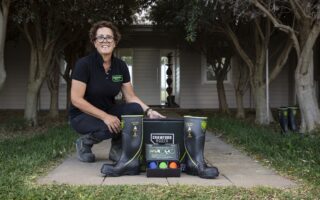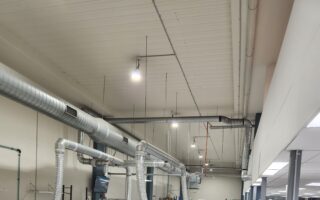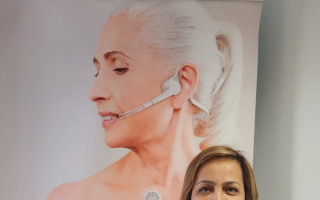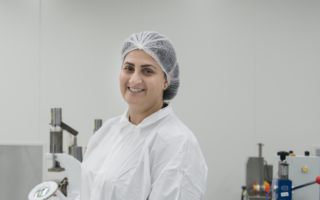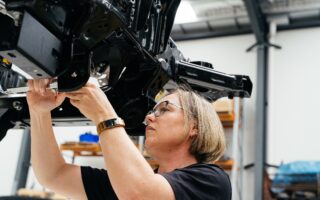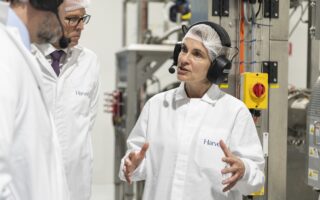AMGC celebrates diversity in manufacturing this International Women’s Day
On International Women’s Day 2023, the Advanced Manufacturing Growth Centre (AMGC) is celebrating six female leaders – all with distinct career journeys – who are challenging stereotypes and misconceptions to pursue a career in manufacturing.
A podiatrist. A fashion business founder. A biomedical researcher. These are just three of the professions that women have come from on the way to positions of leadership within Australian manufacturing businesses.
While manufacturing has long been viewed as a smokey and blokey industry the actual picture is far more diverse and inclusive than many realise. In fact, when manufacturing is evaluated as seven distinct steps along a value chain, female participation increases threefold within the industry.
These roles in pre- and post-production account for researchers, designers, engineers, marketers, sales staff, and numerous others – but all have one thing in common, they are critical roles underpinning a manufacturing business. Addressing this misunderstanding is a work in progress and crucial to ensuring that Australia has the best stewards and talent driving local manufacturing.
“Among other things, broad workforce participation is about commercial viability. If we want manufacturing to be as strong as possible, we couldn’t do it with half the population,” explains Kristi Riordan, the co-founder and CEO of Harvest B, and one of the female leaders profiled below.
“You need the full labour force to be participating.”
Dr Jens Goennemann, Managing Director of AMGC, agrees, adding that an outdated, production-centric view of manufacturing is part of the problem.
“It is not all about blokes in hard hats and high-vis vests. The factory floor is one small component of the manufacturing value chain,“ says Dr Goennemann.
“Embracing the full manufacturing value chain highlights roles where women are much more likely to participate. These include positions ranging from R&D to design through to sales and services. The importance of doing so is highlighted by some of the outstanding leaders we are profiling on IWD 2023.”
Best foot forward
Penny Crawford, a podiatrist by training, ran her own business in Gunnedah for 27 years. The self-described “longtime frustrated inventor” noticed a lot of patients who worked in the local mines came in with issues due to gumboots, a product with a long-time lack of innovation attached to it.
“The gumboots they were wearing in 2013 when I first started this journey were the same gumboots that people wore in the 1950s. And these are people walking up to 12 kilometres a day on uneven ground in dark environments, hazardous areas.”
Crawford is the founder of Crawford Boots and describes her product as footwear with the comfort and stability of a work boot, but the waterproofing of a gumboot.
Separately, Crawford Boots is involved in an AMGC Commercialisation Fund-backed collaborative project led by Molycop, recycling end-of-life products such as gumboots to lower carbon emissions from electric arc furnace steelmaking.
Crawford says that her enterprise has made her appreciate the complexity involved in manufacturing, and the necessity of understanding steps such as R&D, design, and logistics, rather than production alone.
“When you develop a product from a concept to an actual, tangible item for that product to be successful and viable you need to understand your manufacturing process and your supply chain,” Crawford shares.
She believes there is an exciting “manufacturing revival” underway in Australia and a growing appreciation of the range of skills needed.
“Trades are now being recognised as a worthwhile career for males and females, and there’s the avenue for that. You’ve got the design, you’ve got research, even the accounting side,” says Crawford.
“There are so many parts to manufacturing. It’s fantastic that nowadays we’ve also got consumer awareness – they look at their product, they question it, they want to understand it, they want to know its provenance, they want to understand its supply chain, its origins, the materials used. So, I think the manufacturing value chain is the career choice of the future.”
Successful succession
Serena Ross has helped her family electronics business, Circuitwise, find its focus. After stepping into the CEO role in 2019 and helping implement a strategic reset with her brother Sean, the company has grown 30 per cent year-on-year.
Founded in 1987, the 35-year-old business and AMGC member manufactures printed circuit board assemblies (PCBAs) for clients in highly-regulated industries such as medical technology and defence.
Ross worked at Circuitwise before graduating from university, founded and later sold a fashion business, and then returned to the family company after six years with a renewed appreciation and a lot more motivation.
From stepping back into her old purchasing manager role for a few years, “I ended up taking the role of general manager and then eventually my parents retired four years ago, and I took over the role of CEO,” says Ross.
“When I took over as CEO, I knew a lot about the business as well as what I wanted to change about it.”
She describes the business as more strategic now in the work it says yes to, rather than “trying to be everything to everybody,” and is bullish about the future of both Circuitwise and manufacturing in general.
“I think the whole industry has really shifted noticeably in the last few years; I think that there’s an energy that is here and the technological advances that are upcoming are very, very exciting, and I think this is the area to be in,” Ross explains.
“And I feel as though making things has a sense of accomplishment that perhaps other industries don’t have.
“More young people are getting into the industry and there is a lot more focus on improving the culture in manufacturing now. That’s a huge focus for us. I believe manufacturing is going to grow into a really exciting industry, like the tech industry. And we’re always going to need manufacturing.”
Giving a voice to the voiceless
Iranian-born inventor Dr Farzaneh Ahmadi was torn between a love of biology and maths when she began university. Maths won out, she graduated with an electrical engineering degree, and she worked as the R&D Project lead in the industry for three years before heading back to both university and biology for a PhD focusing on giving a voice to the voiceless.
“The only reason I ended up solving the problem was because of that unique industrial experience, Ahmadi explains.
“Because as part of industrial R&D we had to work on a very limited budgets and tight deadlines. I sort of started to find shortcuts about things and then when I went back to university for my PhD on giving a voice to the voice-less, I wasn’t a regular PhD student. I was actually sort of an outsider pushing for timely delivery of scientific research.”
Ahmadi left academia and joined her brother Mousa to deliver on their dream of restoring natural-sounding speech to laryngectomy patients.
After nearly a decade of progress in bionic voice research, she is now the CEO and co-founder of Laronix, a Brisbane-based startup of eight people that is moving towards the manufacture of her multi-award-winning invention with assistance from AMGC’s Commercialisation Fund.
“This is the first device that a permanently voiceless person can sing with, and they can have a male or female voice, so sometimes when I’m working, I can hear them in the background participating in our online singing classes for example,” Ahmadi tells us.
She describes her days as spent overseeing project modules, continuously negotiating with, and reporting to investors, applying for grants, and managing her team.
Ahmadi advises a young female aspiring to find a world-changing startup to explore and figure out their passion, as the path is a challenging and a complex one.
“My recommendation is also to learn about design. Because in manufacturing, you can be a very strong technician, you can be a very hands-on engineer, you can be an excellent project manager. The work spans all of these, and all of them are equally important,” Ahmadi says.
“Sometimes the company needs an excellent technician because those are the ones who actually do the job. So, you need to be exploring, getting an education, having visits to manufacturing plants, or joining breakthrough companies’ presentations.”
From the floor up
Rita Daoud, Manufacturing Manager at Romar Engineering, started at the company as an intern during her Biomedical Engineering degree.
Today she oversees moulding, trading and elastomers divisions at the Western Sydney contract manufacturing business, which was founded in 1968 and has had a hand in some of Australia’s most important medical innovations including partnering with a range of AMGC co-invested projects. She also takes care of new projects, workplace health and safety, and quoting.
Along the way, she has been QA engineer, head of cleanroom manufacturing and more besides.
“I did this for a couple of years and really got to see how manufacturing worked from the floor up,” Daoud adds of early cleanroom work.
Daoud was drawn to and has stayed in manufacturing throughout her career by the “satisfaction of creating something tangible and beneficial out of raw components. I also love the constant advancements that we see in manufacturing.
“I’m always learning something new!”
Daoud recommends a career in manufacturing to anybody that is curious, adding that it will keep you on your feet and mentally engaged. She advises that the ideal place to start a career is the factory floor, as she did, learning as much as possible about processes and then moving up through the business.
“I also highly recommend a solid quality background, ISO 9001 and lean manufacturing principles at the very least. There are many entry-level positions available at the moment and with a lot of production work returning to Australia, the opportunities to advance are high.”
To be a valued part of a team…
Holly Munro, Program Manager at Premcar, enjoys a dream job at the engineering firm, which offers an array of manufacturing solutions for the automotive, aerospace and defence industries – including an AMGC co-invested project to repower land-based vehicle for Australia’s Defence Force.
After nearly two decades at Toyota Australia, where she started her career and eventually helped decommission the Altona factory, Munro realised exactly what she wanted from her next job: “to be a valued part of a team that was committed to something we believed in.”
On a typical day, Munro tracks tasks to plan, including CAD design, parts manufacturing, and workshop activities. She is currently responsible for multiple projects, such as building a one-off prototype vehicle and an off-road caravan suspension system.
“I enjoy working with all the people who are required to make these complex projects happen, and I especially enjoy the moments when all the planning and changing comes together,” explains Munro.
After studying as an engineer, Munro followed where her skills and opportunities took her, which just happened to be in manufacturing.
“I love processes and figuring out the best way to do things, which is always changing. Many people working together is a great thing to be a part of, and there is great pride in producing something that people use and love. Manufacturing provides these opportunities.”
To those considering a career in manufacturing, Munro says there are endless opportunities to be grasped.
“Manufacturing is a brilliant industry to learn about people, the things you’re making and your individual skills,” she explains, adding that the skills developed are hugely transferable.
“There are so many things that go into manufacturing, including tools, equipment, technology, logistics, buildings, facilities, people and process management.”
‘Meating’ the challenge of future foods
Kristi Riordan moved from the United States to Australia on a Global Talent Visa in 2019, after spending the last two decades in what she describes as “building venture-backed companies involved in category transformation.”
With a desire to establish a “climate-positive” venture, she co-founded plant-based ingredient startup Harvest B, her first manufacturing business, in 2020. With the assistance of AMGC, it addresses a shortage of onshore processing capabilities and an overall lack of innovation on both taste and cost in plant-based meats.
As most founders will tell you if asked, there’s no typical day. However, Riordan’s work life is arranged around three pillars: product development, innovation and production on the internal side, external activities of sales, public representations of Harvest B and fundraising on the external side, and finally strategy.
“As founders and builders, we thrive on having that opportunity to work in multiple different areas of the business versus being very siloed – this is often the magic of a startup,” Riordan tells us.
“What I enjoy the most is the connections we are able to make as an early-stage business and the speed of decision-making to commercialise rapidly. In a category that is being transformed, we see the future being built from the front lines of the supply chain.”
Unsurprisingly, she sees great opportunities and careers to be realised in the agri-food industry.
“Agri-food is going to be a very exciting place to be over the next decade with Australia having a front-row seat. And manufacturing is a critical pillar of its success, says Riordan.”
“If you’re a young woman and you find yourself connected to any part of agrifood and manufacturing, find a pathway in, find somebody you connect with, find a business, find a mentor, find a sponsor and just start pulling the threads on the things that you’re excited about.”

